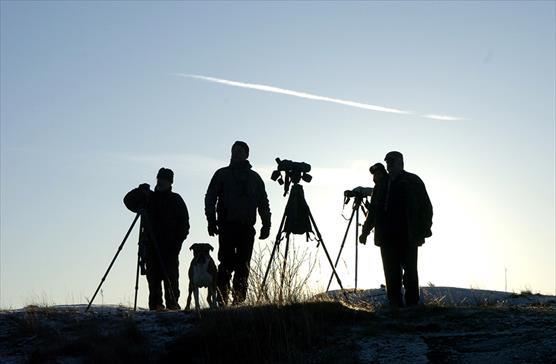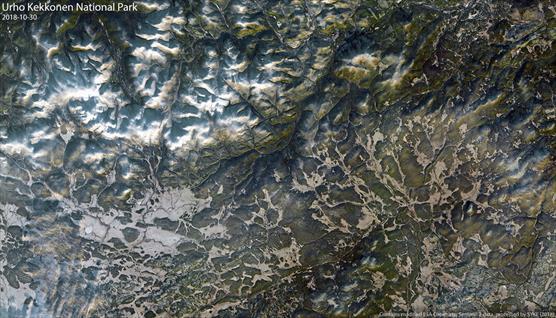Press release 2020-05-29 at 8:57
The Finnish Environment Institute (SYKE) and the Ministry of the Environment report
The state of biodiversity and ecosystems has deteriorated both in Finland and globally. Planning and implementing effective corrective measures requires more comprehensive and up-to-date information about nature than before. According to the recent EU biodiversity strategy, it is also necessary to develop a knowledge base on nature that can support decision-making processes. Data on nature is also needed in climate change mitigation since the deterioration of the state of biodiversity and climate change are also strongly intertwined problems.
"We want our politics to be strongly based on knowledge in the government. The additional appropriations for nature conservation enables more up-to-date access to information on nature. The Finnish Ecosystem Observatory that is now being launched will collect and develop solutions that help safeguard the biodiversity of our nature. We need topical and researched information to solve the sustainability crisis,” says Krista Mikkonen, the Minister of the Environment and Climate Change.
In order to monitor the long-term impacts of investments in improving the state of nature and ecosystems, uniform methods are needed to manage information. In addition, new observation methods are needed to measure the impacts of restoration on biodiversity and ecosystems. The goal of the Finnish Ecosystem Observatory is to bring solutions to these challenges.
Goal to stop the loss of biodiversity and mitigating climate change
The Finnish Ecosystem Observatory (FEO) creates a national cooperation model and information platform to support extensive monitoring, evaluation and research of ecosystems. The project brings together fragmented activities supporting the monitoring of the state of nature and improves underdeveloped parts of research and monitoring infrastructures.

Counting migratory birds Gulf of Finland. Photo Riku Lumiaro.
The project promotes the utilisation and development of observation networks, remote sensing data, analysis algorithms and open data and reporting products. The rapidly increasing amount of different types of digital data, the increased openness and accessibility of data, and the development of analysis and modelling methods make the launch of the Finnish Ecosystem Observatory now relevant.
"By developing national cooperation and combining existing data collection and usage methods, it is possible to produce integrated information to meet the needs of decision-making parties and to create policy recommendations that can be used to stop the deterioration of the state of nature and to implement the climate and ecosystem benefits of restoring habitats in a broad-based manner," says Petteri Vihervaara, the Director of the project at the Finnish Environment Institute.
The Finnish Ecosystem Observatory will be launched with funding from the Ministry of the Environment and the Finnish Environment Institute; the first year's investment is approximately EUR 1.3 million. The activities of the Finnish Ecosystem Observatory will be developed as broad-based cooperation between different actors, and in the future, the project aims to gather more funding base for their activities.
Better use of existing data on nature and new methods of data collection
More detailed information on the number and condition of habitats is needed throughout Finland. Especially on the municipal and regional levels, there is an increasing need for carbon neutral land-use planning that supports biodiversity. Vihervaara describes the challenges of the current situation: "To date, comprehensive information on Finnish nature has not been easily available from one source. The majority of the working time of researchers and experts has gone to hunting down initial data from several different sources.“
The modernisation of the production of data on nature is one of the goals of the Finnish Ecosystem Observatory. New methods can be developed for gathering data on nature and monitoring the state of ecosystems. For example, the Copernicus satellite data from the European Union could be used more than at present especially because Finland invests more than 8 million euros annually in the production of this data. The launch of the Finnish Ecosystem Observatory is a significant leap forward in modernising biodiversity and ecosystem monitoring. At the same time, Finland shows a pioneering attitude for other EU member states as similar systems do not yet exist in many other countries either.
”Improving the biodiversity and ecosystem monitoring is becoming increasingly important topic also among the international science-policy landscape, such as setting of the Post-2020 Biodiversity Targets of the Convention on Biological Diversity, where Finland shows leadership with this new initiative.” says Vihervaara.
New technological solutions and the development of monitoring methods based on them have revolutionised our ability to obtain almost real-time information on the state of ecosystems. By combining remote sensing and artificial intelligence applications with accurate in-situ measurements and modelling, the impacts of land use or climate change on the state of biodiversity or ecosystem processes, such as carbon circulation, can be predicted.

Satellite image of North Finland Urho Kekkonen National Park.
Alongside the development of methods, it is important to ensure the openness of data and models which is the starting point for the operations of the ecosystem observatory. The openness of information used as a basis for decision making is a key part of assessing the reliability of information and the transparency of decision-making processes.
Researchers, experts and citizens benefit extensively from the more automated processing and sharing of previously fragmented data through interoperable information systems.
“Our goal is that, in four years' time, the Finnish Ecosystem Observatory will widely serve those in need of data on nature - from the municipal level to EU-level decision-making," says Vihervaara.
Further information
Biodiversity
The Director of the project Petteri Vihervaara, Head of Unit, Finnish Environment Institute (SYKE)
tel. +358 295 251740, firstname.lastname@ymparisto.fi
Ecosystem processes
Research Professor Martin Forsius, Finnish Environment Institute (SYKE), tel. +358 295 251 118, firstname.lastname@ymparisto.fi
Information systems
Development Manager Saku Anttila, Finnish Environment Institute (SYKE), tel. +358 295 251 069, firstname.lastname@ymparisto.fi
Project Coordinator Peter Kullberg, Finnish Environment Institute (SYKE), tel. +358 295 251 965, firstname.lastname@ymparisto.fi